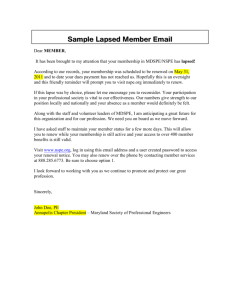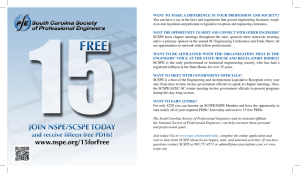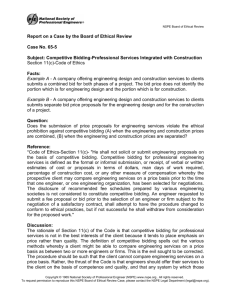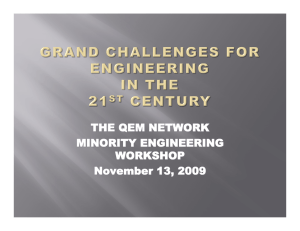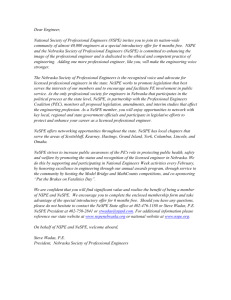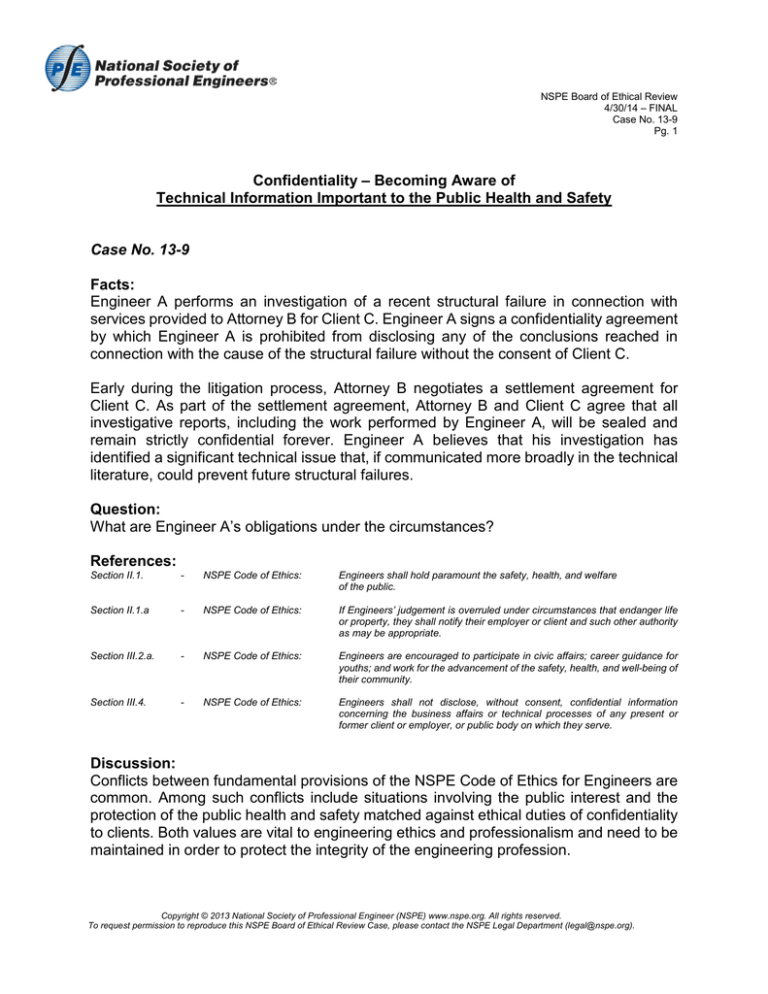
NSPE Board of Ethical Review
4/30/14 – FINAL
Case No. 13-9
Pg. 1
Confidentiality – Becoming Aware of
Technical Information Important to the Public Health and Safety
Case No. 13-9
Facts:
Engineer A performs an investigation of a recent structural failure in connection with
services provided to Attorney B for Client C. Engineer A signs a confidentiality agreement
by which Engineer A is prohibited from disclosing any of the conclusions reached in
connection with the cause of the structural failure without the consent of Client C.
Early during the litigation process, Attorney B negotiates a settlement agreement for
Client C. As part of the settlement agreement, Attorney B and Client C agree that all
investigative reports, including the work performed by Engineer A, will be sealed and
remain strictly confidential forever. Engineer A believes that his investigation has
identified a significant technical issue that, if communicated more broadly in the technical
literature, could prevent future structural failures.
Question:
What are Engineer A’s obligations under the circumstances?
References:
Section II.1.
-
NSPE Code of Ethics:
Engineers shall hold paramount the safety, health, and welfare
of the public.
Section II.1.a
-
NSPE Code of Ethics:
If Engineers’ judgement is overruled under circumstances that endanger life
or property, they shall notify their employer or client and such other authority
as may be appropriate.
Section III.2.a.
-
NSPE Code of Ethics:
Engineers are encouraged to participate in civic affairs; career guidance for
youths; and work for the advancement of the safety, health, and well-being of
their community.
Section III.4.
-
NSPE Code of Ethics:
Engineers shall not disclose, without consent, confidential information
concerning the business affairs or technical processes of any present or
former client or employer, or public body on which they serve.
Discussion:
Conflicts between fundamental provisions of the NSPE Code of Ethics for Engineers are
common. Among such conflicts include situations involving the public interest and the
protection of the public health and safety matched against ethical duties of confidentiality
to clients. Both values are vital to engineering ethics and professionalism and need to be
maintained in order to protect the integrity of the engineering profession.
Copyright © 2013 National Society of Professional Engineer (NSPE) www.nspe.org. All rights reserved.
To request permission to reproduce this NSPE Board of Ethical Review Case, please contact the NSPE Legal Department (legal@nspe.org).
NSPE Board of Ethical Review
4/30/14 – FINAL
Case No. 13-9
Pg. 2
One of the earliest NSPE Board of Ethical Review cases that sought to balance these two
considerations was BER Case No. 76-4. In that case, the XYZ Corporation had been
advised by a State Pollution Control Authority that it had 60 days to apply for a permit to
discharge manufacturing wastes into a receiving body of water. XYZ was also advised of
the minimum standard that must be met for that discharge. In an effort to convince the
authority that the body of water, after receiving the manufacturing wastes, would still meet
established environmental standards, the corporation employed Engineer Doe to perform
consulting engineering services and submit a detailed report. After completion of his
studies but before completion of any written report, Doe concluded that the discharge
from the plant would lower the quality of the receiving body of water below established
standards. He further concluded that corrective action would be very costly. Doe verbally
advised the XYZ Corporation of his findings. Subsequently, the corporation terminated
the contract with Doe with full payment for services performed and instructed Doe not to
render a written report to the corporation. Thereafter, Doe learned that the authority had
called a public hearing and that the XYZ Corporation had presented data to support its
view that the present discharge meets minimum standards. In deciding that Doe had an
ethical obligation to report his findings to the authority upon learning of the hearing, the
Board noted that the NSPE Code requires that [Doe’s] duty to the public be paramount.
In this case, it is presumed that a failure to meet the minimum standards established by
law is detrimental to the public health and safety.
Later in BER Case No. 07-3, Engineer A was retained by a warranty company to perform
warranty inspections on manufactured building claims filed against a manufactured
building company. Engineer A was asked to inspect a building for the company relating
to a claim by Owner A regarding certain mechanical and electrical issues. During the
course of the inspection, Engineer A investigated mechanical and electrical issues but
also separately discovered that the building plans prepared by a manufactured building
employed engineer indicated that the building was built in 2002 with a roof load
requirement of 40 pounds per-square-foot. However, Engineer A was aware that the local
code requirements were changed in 2000 with load requirements of 80 pounds persquare-foot because of local snow conditions. The engineering drawings were submitted
to a local code official in 2002 and they were approved with the 40 pounds per-squarefoot included. Engineer A advised the warranty company and the manufactured building
company, and neither believed any remedial action was necessary. With winter
approaching, Engineer A was concerned about the potential danger of a heavy snow
causing a roof collapse to the occupants of these buildings.
Copyright © 2013 National Society of Professional Engineer (NSPE) www.nspe.org. All rights reserved.
To request permission to reproduce this NSPE Board of Ethical Review Case, please contact the NSPE Legal Department (legal@nspe.org).
NSPE Board of Ethical Review
4/30/14 – FINAL
Case No. 13-9
Pg. 3
In reviewing the facts, the BER decided that it would be ethical for Engineer A to (1) first
give the building manufacturing company the opportunity to contact the local code
enforcement authorities and only if the building manufacturing company did not act within
a reasonable period of time, then (2) take further action including personally contacting the
building code enforcement authorities, and if necessary, contacting appropriate state
building officials. According to the Board, the obligation to protect the public heath and
safety takes precedence and overrides other considerations in most cases. The Board in
Case No. 07-3 said “in most cases” because the Board conceived of at least some
circumstances in which the risk the public health and safety may be somewhat marginal or
remote and therefore other ethical considerations may be viewed in a different light. While
Case 07-3 raised the possibility of a significant risk to the public health and safety, it does
illustrate that sometimes the risk may not be immediate or imminent and therefore other
factors may come into play. Certainly, the need to address the risk to the public can never
be ignored or delayed unreasonably. However, where a risk is more remote, the engineer’s
ethical obligations might take on different dimensions. For example, under the facts in Case
07-3, since the risk was not immediate, Engineer A may have had an opportunity to explore
a variety of different approaches (e.g., give the building manufacturing company the
opportunity to contact the local code enforcement authorities and only if the building
manufacturing company did not act within a reasonable period of time, take further action
including personally contacting the building code enforcement authorities, and if necessary,
contacting appropriate state building officials).
Turning to the facts in the present case, it is the Board’s view that this case is another
illustration of the ongoing tensions that often exist between two fundamental ethical
principles—here duty of confidentiality vs. protection of the public health and safety.
Engineer A should always explore negotiating appropriate language in his agreement with
attorneys or clients recognizing the engineer obligations to report safety violations as
necessary to protect the public health and safety. The Board is not willing to go as far as
an earlier Board went in BER Case No. 76-4 in concluding that the public health and
safety issue supersedes Engineer A’s confidentiality obligations, largely for the reasons
identified in Case No. 07-3—that there was no immediate or imminent danger or threat to
the public health, safety, or welfare. Instead, Engineer A’s belief that his investigation has
identified a significant technical issue that, if communicated more broadly in the technical
literature, could prevent future structural failures is prospective and speculative.
It is the Board’s view that Engineer A should explain to Attorney B and Client C his ethical
obligation to work for the advancement of the safety, health, and well-being of the
community and explore an alternative path to identifying the technical issues involved,
including developing a paper or article that explains his technical concerns without
revealing specific and identifiable facts and circumstances that would compromise the
settlement agreement involving Client C. While this may be difficult because of the
possible need to specifically identify the context upon which Engineer A’s technical issue
is based, it is the Board’s view that this would be a reasonable middle ground for Engineer
Copyright © 2013 National Society of Professional Engineer (NSPE) www.nspe.org. All rights reserved.
To request permission to reproduce this NSPE Board of Ethical Review Case, please contact the NSPE Legal Department (legal@nspe.org).
NSPE Board of Ethical Review
4/30/14 – FINAL
Case No. 13-9
Pg. 4
A to pursue and which would fulfill Engineer A’s ethical responsibilities both to the public
and to the client. The Board also noted that, although the facts of this case do not clearly
indicate whether or not the technical issue that was discovered during his investigation
was of such urgency or hazard that it compromises Engineer A’s obligation to hold
paramount the safety, health, and welfare of the public (Section II.1 of the Code),
Engineer A may in that instance have further ethical obligations to communicate such
issues in the broader technical literature.
Conclusion:
Engineer A should explain to Attorney B and Client C his ethical obligations as a
professional engineer to work for the advancement of the safety, health, and welfare of
the public and explore an alternative path to identifying the technical issue, including
developing a paper or article that explains his technical issues without revealing specific
and identifiable facts and circumstances that would compromise the settlement
agreement involving Client C. However, if Client C refuses to allow Engineer A to
disseminate this information, and Engineer A is convinced that the matter rises to the
level of an imminent or urgent threat to public safety, health, or welfare, Engineer A should
notify such other authorities as may be appropriate to safeguard the public.
Board of Ethical Review:
Curtis A. Beck, P.E., F.NSPE
John C. Branch, P.E.
Daniel K. O’Brien, P.E., F.NSPE
Luke Patterson, P.E.
Robert J. Andreoli, P.E.
Mumtaz A. Usmen, Ph.D., P.E., F.NSPE (Vice Chair)
Samuel G. Sudler III, P.E., NSPE (Chair)
NOTE: The NSPE Board of Ethical Review considers ethical cases involving either real or hypothetical matters submitted to it from
NSPE members, other engineers, public officials, and members of the public. The BER reviews each case in the context of the NSPE
Code and earlier BER opinions. The facts contained in each case do not necessarily represent all of the pertinent facts submitted to
or reviewed by the BER.
Each opinion is intended as guidance to individual practicing engineers, students, and the public. In regard to the question of
application of the NSPE Code to engineering organizations (e.g., corporations, partnerships, sole proprietorships, government
agencies, and university engineering departments), the specific business form or type should not negate nor detract from the
conformance of individuals to the NSPE Code. The NSPE Code deals with professional services, which must be performed by real
persons. Real persons in turn establish and implement policies within business structures.
This opinion is for educational purposes only. It may be reprinted without further permission, provided that this statement is included
before or after the text of the case and appropriate attribution is provided to the National Society of Professional Engineers’ Board of
Ethical Review.
To obtain additional NSPE opinions, visit www.nspe.org or call 800-417-0348.
Copyright © 2013 National Society of Professional Engineer (NSPE) www.nspe.org. All rights reserved.
To request permission to reproduce this NSPE Board of Ethical Review Case, please contact the NSPE Legal Department (legal@nspe.org).

